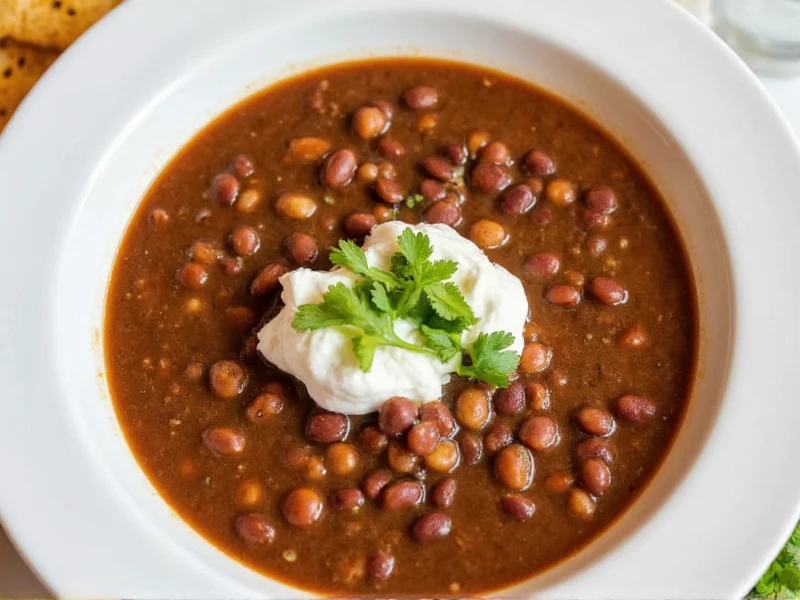Instant Pot black bean soup transforms a traditionally time-consuming dish into a quick weeknight meal without sacrificing depth of flavor. Unlike slow cooker versions that take hours, the pressure cooking function tenderizes dried beans in just 25 minutes while developing complex flavors through the "sauté then steam" technique unique to electric pressure cookers. This method preserves more nutrients than boiling and creates a naturally creamy texture without dairy.
Why This Instant Pot Black Bean Soup Works
Pressure cooking extracts maximum flavor from dried beans while maintaining their structure. The Instant Pot's sealed environment intensifies aromatics like onions, garlic, and smoked paprika, creating restaurant-quality depth in minimal time. Unlike canned bean recipes, starting with dried beans gives you complete control over sodium levels and texture.
Essential Ingredients for Authentic Flavor
The magic happens through layering flavors at different cooking stages. Don't skip the initial sauté step—it builds the flavor foundation that simmering alone can't achieve.
| Ingredient | Amount | Why It Matters |
|---|---|---|
| Dried black beans | 1½ cups (soaked overnight) | Creates superior texture and flavor versus canned beans |
| Yellow onion | 1 large, diced | Provides sweet base notes when caramelized |
| Smoked paprika | 2 tsp | Essential for authentic smoky depth without bacon |
| Chipotle powder | ½ tsp | Adds subtle heat and complexity |
| Vegetable broth | 4 cups low-sodium | Prevents oversalting while boosting umami |
Step-by-Step Cooking Instructions
- Prep beans: Soak dried black beans overnight in cold water (or use quick-soak method: boil 2 minutes, cover and rest 1 hour)
- Sauté aromatics: Set Instant Pot to "Sauté" mode. Cook onions in olive oil until translucent (5 min), add garlic, cumin, smoked paprika and cook 1 minute until fragrant
- Build flavor base: Stir in diced bell pepper, carrots and cook 3 minutes until slightly softened
- Pressure cook: Add soaked beans, broth, diced tomatoes, and bay leaf. Seal lid, set to "Manual" or "Pressure Cook" for 25 minutes on high pressure
- Natural release: Allow 15 minutes natural pressure release before quick-releasing remaining pressure
- Final seasoning: Stir in lime juice and fresh cilantro. For thicker soup, use immersion blender to partially puree
Pro Tips for Restaurant-Quality Results
- Bean soaking is non-negotiable: Skipping this leads to unevenly cooked beans. Quick-soak method works well for same-day cooking
- Layer spices properly: Add dried spices to hot oil briefly to bloom flavors before adding liquids
- Natural release prevents: Mushy beans and soup eruption through the valve
- Acid at the end: Always add lime juice after cooking to brighten flavors without toughening beans
Serving Suggestions and Storage
Serve hot with avocado slices, pickled red onions, and a dollop of Greek yogurt. This instant pot black bean soup recipe stores well for up to 5 days in the refrigerator or 3 months frozen. The flavors actually improve overnight as spices meld. When reheating, add a splash of broth to restore ideal consistency.
Nutritional Benefits
One serving (1½ cups) provides 22g protein, 15g fiber, and essential nutrients like folate and iron. Black beans' resistant starch supports gut health, while the soup's low glycemic index makes it diabetes-friendly. Using dried beans instead of canned reduces sodium by 60% compared to most store-bought versions.
Popular Variations
- Tex-Mex style: Add 1 cup corn and 1 diced jalapeño with the vegetables
- Cuban-inspired: Include 2 minced garlic cloves and 1 tbsp white vinegar in final seasoning
- Protein boost: Stir in 1 cup shredded chicken or chorizo after pressure cooking
- Smoky vegetarian: Add 1 strip of kombu seaweed during cooking for umami depth
Frequently Asked Questions
Can I use canned black beans instead of dried in Instant Pot?
Yes, but reduce cooking time to 5 minutes with quick release. Use 3 cans (15oz each) drained and rinsed. Add them after sautéing vegetables to prevent overcooking. The texture will be softer and less creamy than dried bean versions.
Why does my Instant Pot black bean soup turn out watery?
Watery soup usually results from insufficient natural pressure release (needs 15 minutes minimum) or skipping the partial blending step. For thicker results, use the sauté function after cooking to reduce liquid, or blend 2 cups of soup and return to pot.
How do I prevent black beans from foaming in the Instant Pot?
Rinse soaked beans thoroughly before cooking and avoid overfilling the pot (max ⅔ full). Add 1 tsp oil to the cooking liquid to reduce foaming. Never use the quick release immediately after cooking beans—always allow full natural release first.
What's the best way to freeze Instant Pot black bean soup?
Cool completely, then store in airtight containers with 1-inch headspace for expansion. Freeze flat in gallon bags for space efficiency. Thaw overnight in refrigerator and reheat with ¼ cup broth to restore consistency. Properly stored, it maintains quality for 3 months.
Can I make this black bean soup recipe in a 3-quart Instant Pot?
Yes, but halve the recipe to prevent overfilling. Cooking time remains the same, but monitor liquid levels carefully—smaller pots require precise liquid measurements. The minimum liquid requirement for safe pressure cooking is 1½ cups for most 3-quart models.











 浙公网安备
33010002000092号
浙公网安备
33010002000092号 浙B2-20120091-4
浙B2-20120091-4